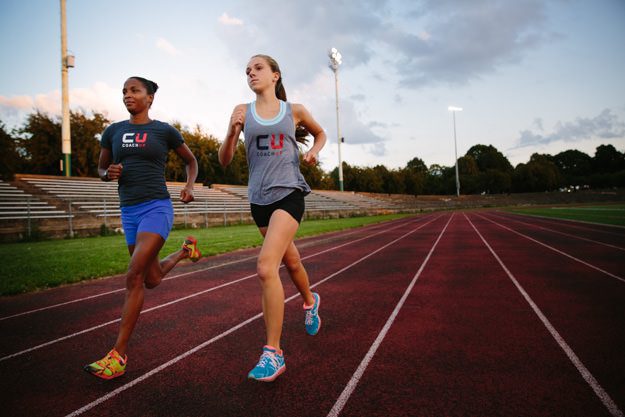Why Being Mindful Is Half The Battle
For Olympians, the road to Rio may have been long and arduous; but for many athletes, the focus is not solely on training their bodies. For an athlete at any level, being mindful is a skill that can greatly improve performance. Take Kayla Banwarth for example, a libero on the U.S. Olympics volleyball team. Not only has she spent countless hours training for the Games but she has also served as an assistant coach for the men’s volleyball team at Pepperdine University. Splitting her time between coaching and training can be draining — both physically and mentally.
But for Kayla, coaching has actually improved her game, making her a more mindful player by allowing her to think more strategically on the court. Viewing the game through the lens of a coach also allows her to more quickly assess what works and what doesn’t, so that solutions are met in a faster way — which is imperative in a sport like volleyball.
At 37 years-old, an age when many Olympic athletes retire, U.S. beach volleyballer, Kerri Walsh-Jennings continues to crush it. How does she do it? Kerri notes that mental preparation can often be an overlooked aspect of training. To address this, three times a day, every day, Kerri sets aside time to train her body, mind, and spirit so that all aspects of her life are being addressed and tended to. Another athlete who works hard to train her mind as well as her body is Sydney McLaughlin. With the help of her coach, the 16 year-old track star overcame non-skill related issues that could have interfered with her performance on Rio’s big stage.
Her coach was able to help combat the idea that she wasn’t ready for the Olympics due to her age, explaining that self-doubt comes from nerves — which, of course, everyone has, even the elites and veterans. In this instance, her coach was able to help her work past her mental barriers in order to excel on the field. Olympic cyclist Kelly Catlin also practices mindfulness to push herself beyond her perceived limits.
She notes that it was when she discovered the strength of her mind that she truly unlocked the full strength of her body. For aspiring athletes, she encourages them to practice mindfulness and always be present. One way to do so is to focus on each sensation, no matter how difficult or uncomfortable it may seem. She believes this is a surefire way to go faster and come even closer to achieving your goals. Every athlete that you watch take the track, field, pool, or court in Rio practices mindfulness in one way or another. This is critical since the brain and the body go hand-in-hand in a major way.
But you don’t have to be an Olympic athlete to reap the benefits of adding mindfulness into your regimen. Things like meditation, deep breathing, and having a mantra that you can repeat to yourself when the going gets tough are some great places to start.
What are some ways that you’ve overcome a hurdle by tapping into your mind? Share with us in the comments below. Or, if you’re ready to work on your mindfulness and preparation, browse our coaches and find your fit!
How useful was this post?
Click on a star to rate it!
Average rating 0 / 5. Vote count: 0
No votes so far! Be the first to rate this post.



